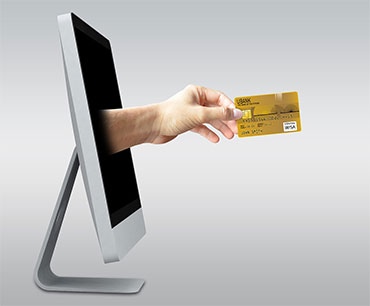While the availability of online shopping is convenient, it also makes it more lucrative for scammers to trick buyers into paying for goods they won’t receive or obtain their personal information.
It’s important to take steps to protect yourself when shopping online.
- Protect your personal information It is normal for online stores to request personal information to personalize your shopping experience. However, if they ask for too much personal information, like your SIN it is a definite red flag.
- Create unique passwords for each site If your login information gets compromised on one site your other accounts will not and don’t ‘opt in’ to save your credit card information on your accounts.
- Look for the ‘S’ Any time you input personal or credit card information into a website, ensure the page is secured. The website URL should start with https:// (rather than http://) or should have a padlock symbol to indicate that the page is secure.
- Only trust secure WiFi Only conduct transactions when you’re on a trusted WiFi network.
- Be wary of dream deals If you think “It’s too good to be true” it usually is.
- Look for customer service information Safe online shopping sites have a toll-free or email address for customer service readily available.
- Don’t click on untrusted pop-up ads While it’s common practice for retailers to use pop-up ads for e-newsletters, promotions and flyers, Pesky pop-ups are a way for scammers to lure or confuse online shoppers. Make sure to have an ad-blocker installed when shopping on unfamiliar websites to avoid getting phished.
- Check your credit card statement Keep a close tab on your credit card statements, even after you’ve received your purchased item.
- Ship to a secure location The rise of online shopping has led to an increase of home deliveries — and with it, an increase in thieves who steal packages from doorsteps. If no one’s home to accept a package, consider shipping to your office or another safe place.
- Don’t save card details – Many e-commerce sites will default to storing your credit card information in your profile for your “convenience” (or their hope you’ll shop there again). They can’t lose what they don’t have, so tell them not to store your credit card unless it is absolutely necessary.
- Use guest login when available – In addition to letting you use an account from other websites, many have an option to use a guest login rather than creating a new account. This is a great option if you don’t expect to need technical support or to do business on a recurring basis. Fewer passwords, fewer personal details, fewer problems if they get hacked.
- Avoid using one account on multiple services – When logging into an e-commerce site it is often tempting to use the “Sign in with Facebook” or “Sign in with Google” button. While it takes a few more minutes to create a new login, it will provide more privacy as you are not sharing all of the sites you shop at with these tech giants.
